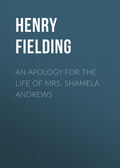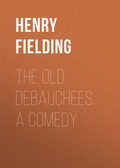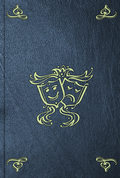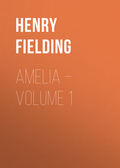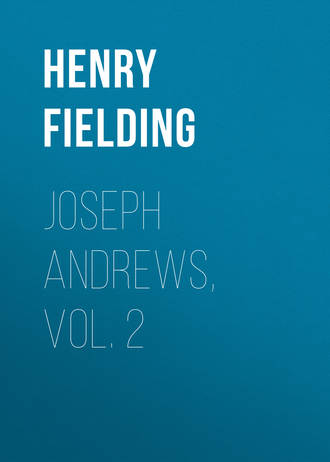
Генри Филдинг
Joseph Andrews, Vol. 2
"SIR, – My father, to whom you sold your ticket in the last lottery, died the same day in which it came up a prize, as you have possibly heard, and left me sole heiress of all his fortune. I am so much touched with your present circumstances, and the uneasiness you must feel at having been driven to dispose of what might have made you happy, that I must desire your acceptance of the enclosed, and am your humble servant,
"HARRIET HEARTY."
And what do you think was enclosed? "I don't know," cried Adams; "not less than a guinea, I hope." Sir, it was a bank-note for £200. – "£200?" says Adams, in a rapture. No less, I assure you, answered the gentleman; a sum I was not half so delighted with as with the dear name of the generous girl that sent it me; and who was not only the best but the handsomest creature in the universe, and for whom I had long had a passion which I never durst disclose to her. I kissed her name a thousand times, my eyes overflowing with tenderness and gratitude; I repeated – But not to detain you with these raptures, I immediately acquired my liberty; and, having paid all my debts, departed, with upwards of fifty pounds in my pocket, to thank my kind deliverer. She happened to be then out of town, a circumstance which, upon reflection, pleased me; for by that means I had an opportunity to appear before her in a more decent dress. At her return to town, within a day or two, I threw myself at her feet with the most ardent acknowledgments, which she rejected with an unfeigned greatness of mind, and told me I could not oblige her more than by never mentioning, or if possible thinking on, a circumstance which must bring to my mind an accident that might be grievous to me to think on. She proceeded thus: "What I have done is in my own eyes a trifle, and perhaps infinitely less than would have become me to do. And if you think of engaging in any business where a larger sum may be serviceable to you, I shall not be over-rigid either as to the security or interest." I endeavoured to express all the gratitude in my power to this profusion of goodness, though perhaps it was my enemy, and began to afflict my mind with more agonies than all the miseries I had underwent; it affected me with severer reflections than poverty, distress, and prisons united had been able to make me feel; for, sir, these acts and professions of kindness, which were sufficient to have raised in a good heart the most violent passion of friendship to one of the same, or to age and ugliness in a different sex, came to me from a woman, a young and beautiful woman; one whose perfections I had long known, and for whom I had long conceived a violent passion, though with a despair which made me endeavour rather to curb and conceal, than to nourish or acquaint her with it. In short, they came upon me united with beauty, softness, and tenderness: such bewitching smiles! – O Mr Adams, in that moment I lost myself, and, forgetting our different situations, nor considering what return I was making to her goodness by desiring her, who had given me so much, to bestow her all, I laid gently hold on her hand, and, conveying it to my lips, I prest it with inconceivable ardour; then, lifting up my swimming eyes, I saw her face and neck overspread with one blush; she offered to withdraw her hand, yet not so as to deliver it from mine, though I held it with the gentlest force. We both stood trembling; her eyes cast on the ground, and mine stedfastly fixed on her. Good G – d, what was then the condition of my soul! burning with love, desire, admiration, gratitude, and every tender passion, all bent on one charming object. Passion at last got the better of both reason and respect, and, softly letting go her hand, I offered madly to clasp her in my arms; when, a little recovering herself, she started from me, asking me, with some show of anger, "If she had any reason to expect this treatment from me." I then fell prostrate before her, and told her, if I had offended, my life was absolutely in her power, which I would in any manner lose for her sake. Nay, madam, said I, you shall not be so ready to punish me as I to suffer. I own my guilt. I detest the reflection that I would have sacrificed your happiness to mine. Believe me, I sincerely repent my ingratitude; yet, believe me too, it was my passion, my unbounded passion for you, which hurried me so far: I have loved you long and tenderly, and the goodness you have shown me hath innocently weighed down a wretch undone before. Acquit me of all mean, mercenary views; and, before I take my leave of you for ever, which I am resolved instantly to do, believe me that Fortune could have raised me to no height to which I could not have gladly lifted you. O, curst be Fortune! – "Do not," says she, interrupting me with the sweetest voice, "do not curse Fortune, since she hath made me happy; and, if she hath put your happiness in my power, I have told you you shall ask nothing in reason which I will refuse." Madam, said I, you mistake me if you imagine, as you seem, my happiness is in the power of Fortune now. You have obliged me too much already; if I have any wish, it is for some blest accident, by which I may contribute with my life to the least augmentation of your felicity. As for myself, the only happiness I can ever have will be hearing of yours; and if Fortune will make that complete, I will forgive her all her wrongs to me. "You may, indeed," answered she, smiling, "for your own happiness must be included in mine. I have long known your worth; nay, I must confess," said she, blushing, "I have long discovered that passion for me you profess, notwithstanding those endeavours, which I am convinced were unaffected, to conceal it; and if all I can give with reason will not suffice, take reason away; and now I believe you cannot ask me what I will deny." – She uttered these words with a sweetness not to be imagined. I immediately started; my blood, which lay freezing at my heart, rushed tumultuously through every vein. I stood for a moment silent; then, flying to her, I caught her in my arms, no longer resisting, and softly told her she must give me then herself. O, sir! can I describe her look? She remained silent, and almost motionless, several minutes. At last, recovering herself a little, she insisted on my leaving her, and in such a manner that I instantly obeyed: you may imagine, however, I soon saw her again. – But I ask pardon: I fear I have detained you too long in relating the particulars of the former interview. "So far otherwise," said Adams, licking his lips, "that I could willingly hear it over again." Well, sir, continued the gentleman, to be as concise as possible, within a week she consented to make me the happiest of mankind. We were married shortly after; and when I came to examine the circumstances of my wife's fortune (which, I do assure you, I was not presently at leisure enough to do), I found it amounted to about six thousand pounds, most part of which lay in effects; for her father had been a wine-merchant, and she seemed willing, if I liked it, that I should carry on the same trade. I readily, and too inconsiderately, undertook it; for, not having been bred up to the secrets of the business, and endeavouring to deal with the utmost honesty and uprightness, I soon found our fortune in a declining way, and my trade decreasing by little and little; for my wines, which I never adulterated after their importation, and were sold as neat as they came over, were universally decried by the vintners, to whom I could not allow them quite as cheap as those who gained double the profit by a less price. I soon began to despair of improving our fortune by these means; nor was I at all easy at the visits and familiarity of many who had been my acquaintance in my prosperity, but had denied and shunned me in my adversity, and now very forwardly renewed their acquaintance with me. In short, I had sufficiently seen that the pleasures of the world are chiefly folly, and the business of it mostly knavery, and both nothing better than vanity; the men of pleasure tearing one another to pieces from the emulation of spending money, and the men of business from envy in getting it. My happiness consisted entirely in my wife, whom I loved with an inexpressible fondness, which was perfectly returned; and my prospects were no other than to provide for our growing family; for she was now big of her second child: I therefore took an opportunity to ask her opinion of entering into a retired life, which, after hearing my reasons and perceiving my affection for it, she readily embraced. We soon put our small fortune, now reduced under three thousand pounds, into money, with part of which we purchased this little place, whither we retired soon after her delivery, from a world full of bustle, noise, hatred, envy, and ingratitude, to ease, quiet, and love. We have here lived almost twenty years, with little other conversation than our own, most of the neighbourhood taking us for very strange people; the squire of the parish representing me as a madman, and the parson as a presbyterian, because I will not hunt with the one nor drink with the other. "Sir," says Adams, "Fortune hath, I think, paid you all her debts in this sweet retirement." Sir, replied the gentleman, I am thankful to the great Author of all things for the blessings I here enjoy. I have the best of wives, and three pretty children, for whom I have the true tenderness of a parent. But no blessings are pure in this world: within three years of my arrival here I lost my eldest son. (Here he sighed bitterly.) "Sir," says Adams, "we must submit to Providence, and consider death as common to all." We must submit, indeed, answered the gentleman; and if he had died I could have borne the loss with patience; but alas! sir, he was stolen away from my door by some wicked travelling people whom they call gipsies; nor could I ever, with the most diligent search, recover him. Poor child! he had the sweetest look – the exact picture of his mother; at which some tears unwittingly dropt from his eyes, as did likewise from those of Adams, who always sympathized with his friends on those occasions. Thus, sir, said the gentleman, I have finished my story, in which if I have been too particular, I ask your pardon; and now, if you please, I will fetch you another bottle: which proposal the parson thankfully accepted.
CHAPTER IV.
A description of Mr Wilson's way of living. The tragical adventure of the dog, and other grave matters
The gentleman returned with the bottle; and Adams and he sat some time silent, when the former started up, and cried, "No, that won't do." The gentleman inquired into his meaning; he answered, "He had been considering that it was possible the late famous king Theodore might have been that very son whom he had lost;" but added, "that his age could not answer that imagination. However," says he, "G – disposes all things for the best; and very probably he may be some great man, or duke, and may, one day or other, revisit you in that capacity." The gentleman answered, he should know him amongst ten thousand, for he had a mark on his left breast of a strawberry, which his mother had given him by longing for that fruit.
That beautiful young lady the Morning now rose from her bed, and with a countenance blooming with fresh youth and sprightliness, like Miss – 2, with soft dews hanging on her pouting lips, began to take her early walk over the eastern hills; and presently after, that gallant person the Sun stole softly from his wife's chamber to pay his addresses to her; when the gentleman asked his guest if he would walk forth and survey his little garden, which he readily agreed to, and Joseph at the same time awaking from a sleep in which he had been two hours buried, went with them. No parterres, no fountains, no statues, embellished this little garden. Its only ornament was a short walk, shaded on each side by a filbert-hedge, with a small alcove at one end, whither in hot weather the gentleman and his wife used to retire and divert themselves with their children, who played in the walk before them. But, though vanity had no votary in this little spot, here was variety of fruit and everything useful for the kitchen, which was abundantly sufficient to catch the admiration of Adams, who told the gentleman he had certainly a good gardener. Sir, answered he, that gardener is now before you: whatever you see here is the work solely of my own hands. Whilst I am providing necessaries for my table, I likewise procure myself an appetite for them. In fair seasons I seldom pass less than six hours of the twenty-four in this place, where I am not idle; and by these means I have been able to preserve my health ever since my arrival here, without assistance from physic. Hither I generally repair at the dawn, and exercise myself whilst my wife dresses her children and prepares our breakfast; after which we are seldom asunder during the residue of the day, for, when the weather will not permit them to accompany me here, I am usually within with them; for I am neither ashamed of conversing with my wife nor of playing with my children: to say the truth, I do not perceive that inferiority of understanding which the levity of rakes, the dulness of men of business, or the austerity of the learned, would persuade us of in women. As for my woman, I declare I have found none of my own sex capable of making juster observations on life, or of delivering them more agreeably; nor do I believe any one possessed of a faithfuller or braver friend. And sure as this friendship is sweetened with more delicacy and tenderness, so is it confirmed by dearer pledges than can attend the closest male alliance; for what union can be so fast as our common interest in the fruits of our embraces? Perhaps, sir, you are not yourself a father; if you are not, be assured you cannot conceive the delight I have in my little ones. Would you not despise me if you saw me stretched on the ground, and my children playing round me? "I should reverence the sight," quoth Adams; "I myself am now the father of six, and have been of eleven, and I can say I never scourged a child of my own, unless as his schoolmaster, and then have felt every stroke on my own posteriors. And as to what you say concerning women, I have often lamented my own wife did not understand Greek." – The gentleman smiled, and answered, he would not be apprehended to insinuate that his own had an understanding above the care of her family; on the contrary, says he, my Harriet, I assure you, is a notable housewife, and few gentlemen's housekeepers understand cookery or confectionery better; but these are arts which she hath no great occasion for now: however, the wine you commended so much last night at supper was of her own making, as is indeed all the liquor in my house, except my beer, which falls to my province. "And I assure you it is as excellent," quoth Adams, "as ever I tasted." We formerly kept a maid-servant, but since my girls have been growing up she is unwilling to indulge them in idleness; for as the fortunes I shall give them will be very small, we intend not to breed them above the rank they are likely to fill hereafter, nor to teach them to despise or ruin a plain husband. Indeed, I could wish a man of my own temper, and a retired life, might fall to their lot; for I have experienced that calm serene happiness, which is seated in content, is inconsistent with the hurry and bustle of the world. He was proceeding thus when the little things, being just risen, ran eagerly towards him and asked him blessing. They were shy to the strangers, but the eldest acquainted her father, that her mother and the young gentlewoman were up, and that breakfast was ready. They all went in, where the gentleman was surprized at the beauty of Fanny, who had now recovered herself from her fatigue, and was entirely clean drest; for the rogues who had taken away her purse had left her her bundle. But if he was so much amazed at the beauty of this young creature, his guests were no less charmed at the tenderness which appeared in the behaviour of the husband and wife to each other, and to their children, and at the dutiful and affectionate behaviour of these to their parents. These instances pleased the well-disposed mind of Adams equally with the readiness which they exprest to oblige their guests, and their forwardness to offer them the best of everything in their house; and what delighted him still more was an instance or two of their charity; for whilst they were at breakfast the good woman was called for to assist her sick neighbour, which she did with some cordials made for the public use, and the good man went into his garden at the same time to supply another with something which he wanted thence, for they had nothing which those who wanted it were not welcome to. These good people were in the utmost cheerfulness, when they heard the report of a gun, and immediately afterwards a little dog, the favourite of the eldest daughter, came limping in all bloody and laid himself at his mistress's feet: the poor girl, who was about eleven years old, burst into tears at the sight; and presently one of the neighbours came in and informed them that the young squire, the son of the lord of the manor, had shot him as he past by, swearing at the same time he would prosecute the master of him for keeping a spaniel, for that he had given notice he would not suffer one in the parish. The dog, whom his mistress had taken into her lap, died in a few minutes, licking her hand. She exprest great agony at his loss, and the other children began to cry for their sister's misfortune; nor could Fanny herself refrain. Whilst the father and mother attempted to comfort her, Adams grasped his crabstick and would have sallied out after the squire had not Joseph withheld him. He could not however bridle his tongue – he pronounced the word rascal with great emphasis; said he deserved to be hanged more than a highwayman, and wished he had the scourging him. The mother took her child, lamenting and carrying the dead favourite in her arms, out of the room, when the gentleman said this was the second time this squire had endeavoured to kill the little wretch, and had wounded him smartly once before; adding, he could have no motive but ill-nature, for the little thing, which was not near as big as one's fist, had never been twenty yards from the house in the six years his daughter had had it. He said he had done nothing to deserve this usage, but his father had too great a fortune to contend with: that he was as absolute as any tyrant in the universe, and had killed all the dogs and taken away all the guns in the neighbourhood; and not only that, but he trampled down hedges and rode over corn and gardens, with no more regard than if they were the highway. "I wish I could catch him in my garden," said Adams, "though I would rather forgive him riding through my house than such an ill-natured act as this."
The cheerfulness of their conversation being interrupted by this accident, in which the guests could be of no service to their kind entertainer; and as the mother was taken up in administering consolation to the poor girl, whose disposition was too good hastily to forget the sudden loss of her little favourite, which had been fondling with her a few minutes before; and as Joseph and Fanny were impatient to get home and begin those previous ceremonies to their happiness which Adams had insisted on, they now offered to take their leave. The gentleman importuned them much to stay dinner; but when he found their eagerness to depart he summoned his wife; and accordingly, having performed all the usual ceremonies of bows and curtsies more pleasant to be seen than to be related, they took their leave, the gentleman and his wife heartily wishing them a good journey, and they as heartily thanking them for their kind entertainment. They then departed, Adams declaring that this was the manner in which the people had lived in the golden age.



